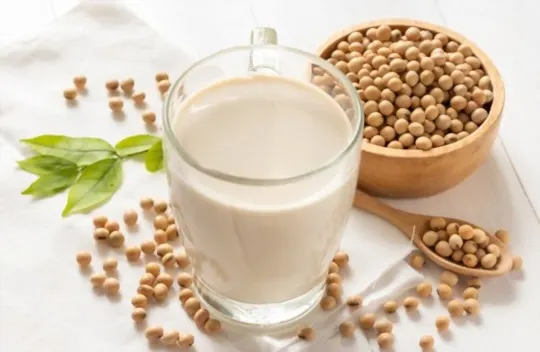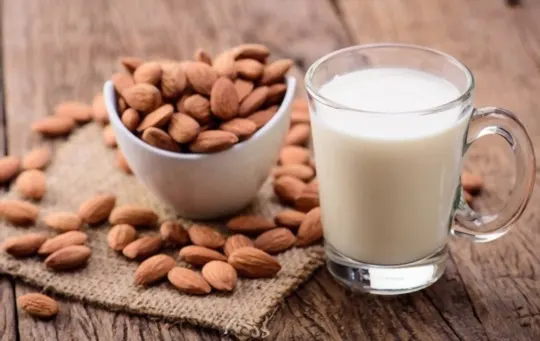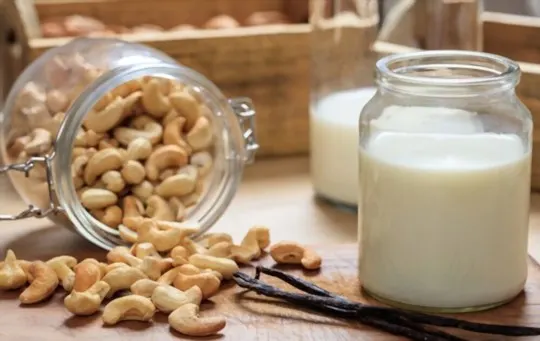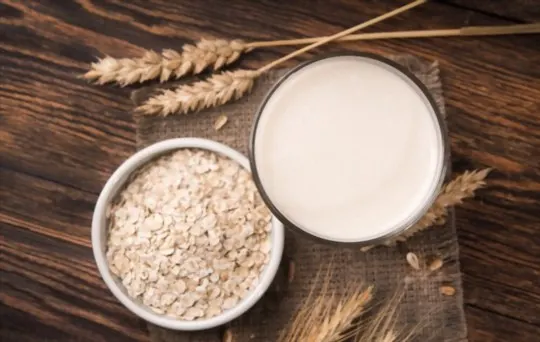You may have heard of skim milk but do you know what it really is? Are there any good alternatives to skim milk?
Read our guide to find out everything you need to know about skim milk, as well as the best substitutes.
Don’t let your diet be limited by the absence of this popular dairy product.
What’s Skim Milk?

Skim milk, also known as fat-free or non-fat milk, is the product of the removal of all fat from the milk.
It can be made from any type of cow’s milk, including whole and 2% reduced fat versions.
Skim milk has a slightly higher protein content than regular (homogenized) milk and because of its low fat content it has fewer calories.
Skim milk is also calcium-rich with a creamy texture and mild flavor making it an ideal choice for a variety of recipes.
In addition to its nutritional benefits, skimmed milk offers several other advantages worth considering.
The most important being that it’s far less likely to spoil quickly when stored at room temperature due to the lack of fats in the product, making it more shelf stable than other types of milks when compared side by side.
Furthermore, many people prefer its mild flavor and creamy texture which makes it ideal for baking recipes as well as other uses such as adding to coffee and tea.
While skimmed milk is an excellent source of nutrition with its low fat content making it a sought after product for health conscious individuals it may not be suitable for everyone’s dietary needs or taste buds; especially those seeking lactose alternatives or vegan options for their diet which will require substituting with plant-based milks such as soy, almond or oatmilk which can provide similar nutritional benefits but with different flavors and textures depending on which one you choose.
How to Drink Skim Milk?
Skim milk is a type of dairy product that has almost no fat, while still delivering the same important nutrients as whole milk or reduced-fat varieties.
For those watching their calorie and saturated fat intake, or who simply don’t enjoy the taste and texture of whole or 2% milk, skim is an ideal substitute.
Here are some tips on how to incorporate it into your diet in tasty and nutritious ways.
- Use it as a creamer for your coffee: Skim milk adds a milder flavor to your morning cup without the sugar and fat of standard creamers.
- Try it with cereal: Substituting skim milk when having cereal not only reduces sugar and calorie intake but can also lend a lighter consistency than other dairy milks.
- Use it in baking: In baking recipes that have fatty ingredients like oil or butter, adding skim milk can help balance out the flavor profile by providing creaminess without hastening spoilage.
- Include it in smoothies: To help create smoother smoothies with fewer calories, try substituting whole milk with skim in all kinds of flavor combinations—from frozen fruit blends to low-calorie desserts.
- Make a creamy soup: Using skim milk instead of cream when making soups or sauces can add depth of flavor without compromising nutrition facts—and since many recipes call for some form of dairy product anyway, using skim is an excellent way to reduce indulgent dishes’ calorie counts without sacrificing taste.
5 Best Skim Milk Substitutes to Consider
If you’re looking for a non-dairy alternative for your morning cup of coffee, there are many great options that can provide your desired flavor.
Here are five popular and tasty substitutes for skim milk:
1 – Soy Milk

Soy milk is one of the most popular substitutes for skim milk.
It is low in fat and calories, but also contains a high amount of protein, making it a great option for those who are looking to increase their protein intake.
Additionally, it contains essential fatty acids as well as calcium and vitamin D.
Soy milk also has a thick and creamy texture which gives it an almost milky consistency when added to foods like oatmeal or cereal.
2 – Almond Milk

Almond milk is a great alternative for those looking for non-dairy milk.
It is made from ground almonds, water, and often sweetener and salt.
Almond milk has a very mild taste and can be used in place of skim milk in baking, smoothies, coffee, and other recipes.
It contains lower amounts of fat and calories than cow’s milk, but it also has less protein since it is plant-based.
Almond milk may have added vitamins and minerals, so make sure you read the label carefully before purchasing.
Additionally, because almond milk is mostly water-based and higher in carbohydrates than regular milk or other dairy products, it’s not the best choice if you’re trying to cut down on carbohydrates or calories.
3 – Cashew Milk

Cashew milk is a great alternative for those looking for a nutty and creamy texture.
It is made from blending raw cashews and water, which gives it a naturally sweet taste.
Cashew milk is rich in healthy fats and some vitamins, like vitamin E.
It also has more potassium than skim and 2% milk, making it an excellent choice for people looking to get the most out of their diet.
Additionally, Cashew Milk contains no saturated fat and is low in calories, making it the perfect substitute for skim milk in baking or drinks.
4 – Coconut Milk

Coconut Milk offers a great alternative if you are looking for a dairy free substitute for skim milk.
It’s a naturally creamy, sweet liquid with more fat content than other varieties of plant-based milks.
It’s made from blending coconut cream with water and is usually fortified with vitamins and minerals like calcium, vitamin A, vitamin B-12, and zinc.
Coconut milk has a low saturated fat content, making it heart-healthy option to incorporate into your daily dietary routine.
Some commercial brands contain added sugars which can increase the calorie count of the product; however, the unsweetened version has about 20 calories per one-cup serving which is similar to skim milk.
As well as being lactose free and vegan friendly, it’s also suitable for those who have nut allergies making it an excellent alternative to skim milk.
Whole fat versions of coconut milk can be substituted for whole/full cream cow’s milk or half-and-half in recipes or beverages where there won’t be any compromise in flavor or texture.
5 – Oat Milk

Oat milk is made using whole oats, which are dried and grounded, boiled in water and then strained through a cheesecloth.
Oat milk is creamy and slightly sweet.
It’s a great way to get the nutrition benefits of oats without adding a lot of fat to your diet.
Oat milk has more protein than almond milk, but less fat than other dairy substitutes.
Plus, oat milk is one of the best choices for people who are lactose intolerant or have other dietary restrictions.
It can also be used as a vegan alternative in baking or for creamy sauces – perfect for many vegetarian dishes.
Conclusion
Skim milk is a popular dairy choice as it is lower in calories and fat than other milk varieties while still being rich in important vitamins and minerals.
While you can always reach for the traditional version, there are also some key alternatives that can effectively replace skim milk in any recipe.
These substitutes range from plant-based options to dairy variations that can help you achieve a similar flavor profile without sacrificing the desired texture or consistency.
Overall, choosing an effective skim milk substitute comes down to personal preference.
No matter which alternative you choose, be sure to check the calorie content of each ingredient beforehand to ensure that you’re getting adequate nutrition from your meals.
From soy milk to cottage cheese and yogurt blends, there are plenty of great skim milk alternatives just waiting to be tried.

5 Best Skim Milk Substitutes to Consider
Ingredients
- 1 – Soy Milk
- 2 – Almond Milk
- 3 – Cashew Milk
- 4 – Coconut Milk
- 5 – Oat Milk
Instructions
- Choose your preferred substitute from the list of options.
- Organize all of your ingredients.
- Use the proper substitute to cook your recipes.

Carrie is a food writer and editor with more than 15 years of experience. She has worked for some of the biggest names in the food industry, including Bon Appétit, Food & Wine, and Martha Stewart Living.
As the Editor in Chief of IntroChicago.com, Carrie oversees all of the content on the site. She also manages the team of contributing writers and editors, who help to create delicious recipes, helpful tips, and informative articles that you’ll find on the site.
A native of the Chicago area, Carrie is passionate about all things food. She loves trying new restaurants and experimenting with new recipes in her kitchen. She’s also a graduate of the Culinary Institute of America, so she knows a thing or two about food!
